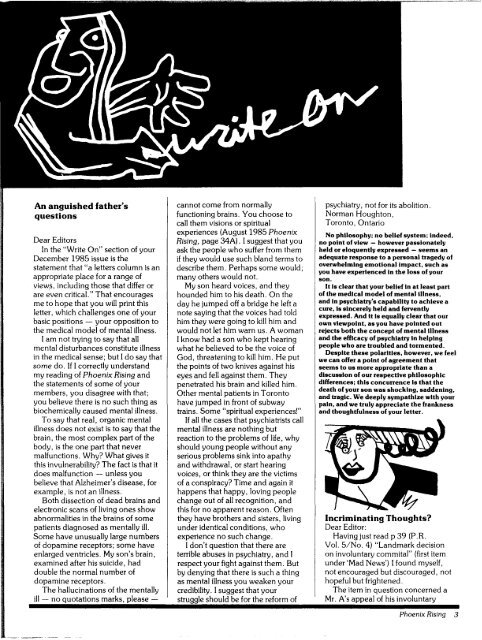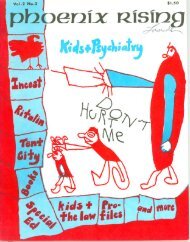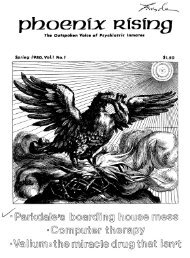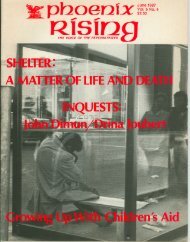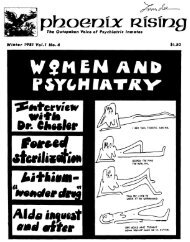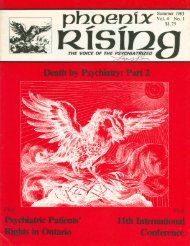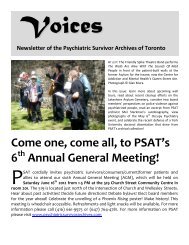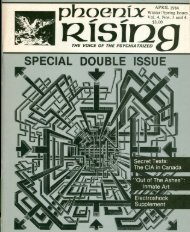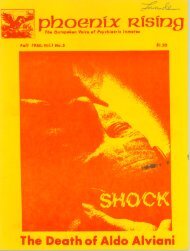Vol. 6, No. 1 - Psychiatric Survivor Archives of Toronto
Vol. 6, No. 1 - Psychiatric Survivor Archives of Toronto
Vol. 6, No. 1 - Psychiatric Survivor Archives of Toronto
- No tags were found...
You also want an ePaper? Increase the reach of your titles
YUMPU automatically turns print PDFs into web optimized ePapers that Google loves.
An anguishedquestionsDear Editorsfather'sIn the "Write On" section <strong>of</strong> yourDecember 1985 issue is thestatement that "a letters column is anappropriate place for a range <strong>of</strong>view,s, including those that differ orare even critical." That encouragesme to hope that you will print thisletter, which challenges one <strong>of</strong> yourbasic positions - your opposition tothe medical model <strong>of</strong> mental illness,I am not trying to say that allmental disturbances constitute illnessin the medical sense; but I do say thatsome do. If I correctly understandmy reading <strong>of</strong> Phoenix Rising andthe statements <strong>of</strong> some <strong>of</strong> yourmembers, you disagree with that;you believe there is no such thing asbiochemically caused mental illness.To say that real, organic mentalillness does not exist is to say that thebrain, the most complex part <strong>of</strong> thebody, is the one part that nevermalfunctions. Why? What gives itthis invulnerability? The fact is that itdoes malfunction - unless youbelieve that Alzheimer's disease, forexample, is not an illness.Both dissection <strong>of</strong> dead brains andelectronic scans <strong>of</strong> living ones showabnormalities in the brains <strong>of</strong> somepatients diagnosed as mentally ill.Some have unusually large numbers<strong>of</strong> dopamine receptors; some haveenlarged ventricles. My son's brain,examined after his suicide, haddouble the normal number <strong>of</strong>dopamine receptors.The hallucinations <strong>of</strong> the mentallyill - no quotations marks, please -cannot come from normallyfunctioning brains. You choose tocall them visions or spiritualexperiences (August 1985 PhoenixRising, page 34A) , I suggest that youask the people who suffer from themif they would use such bland terms todescribe them. Perhaps some would;many others would not.My son heard voices, and theyhounded him to his death. On theday he jumped <strong>of</strong>f a bridge he left anote saying that the voices had toldhim they were going to kill him andwould not let him warn us. A womanI know had a son who kept hearingwhat he believed to be the voice <strong>of</strong>God, threatening to kill him. He putthe points <strong>of</strong> two knives against hiseyes and fell against them. Theypenetrated his brain and killed him.Other mental patients in <strong>Toronto</strong>have jumped in front <strong>of</strong> subwaytrains. Some "spiritual experiences!"If all the cases that psychiatrists callmental illness are nothing butreaction to the problems <strong>of</strong> life, whyshould young people without anyserious problems sink into apathyand withdrawal, or start hearingvoices, or think they are the victims<strong>of</strong> a conspiracy? Time and again ithappens that happy, loving peoplechange out <strong>of</strong> all recognition, andthis for no apparent reason. Oftenthey have brothers and sisters, livingunder identical conditions, whoexperience no such change.I don't question that there areterrible abuses in psychiatry, and Irespect your fight against them. Butby denying that there is such a thingas mental illness you weaken yourcredibility. I suggest that yourstruggle should be for the reform <strong>of</strong>psychiatry, not for its abolition.<strong>No</strong>rman Houghton,<strong>Toronto</strong>, Ontario<strong>No</strong> philosophy; no belief system; indeed,no point <strong>of</strong> view - however passionatelyheld or eloquently expressed - seems anadequate response to a personal tragedy <strong>of</strong>overwhelming emotional Impact, such asyou have experiencedson.In the loss <strong>of</strong> yourlt Is clear that your belief In at least part<strong>of</strong> the medical model <strong>of</strong> mentall1lness,and In psychiatry's capability to achieve acure, Is sincerely held and ferventlyexpressed. And It Is equally clear that ourown viewpoint, as you have pointed outrejects both the concept <strong>of</strong> mentall1lnessand the efficacy <strong>of</strong> psychiatry In helpingpeople who are troubled and tormented.Despite these polarities, however, we feelwe can <strong>of</strong>fer a point <strong>of</strong> agreement thatseems to us more appropriate than adiscussion <strong>of</strong> our respective philosophicdifferences; this concurrence Is that thedeath <strong>of</strong> your son was shocking, saddening,and tragic. We deeply sympathize with yourpain, and we truly appreciate the franknessand thoughtfulness <strong>of</strong> your letter.IncriminatingDear Editor:Thoughts?Having just read p 39 (P. R.<strong>Vol</strong>. SI<strong>No</strong>. 4) "Landmark decisionon involuntary commital" (first itemunder 'Mad News') I found myself,not encouraged but discouraged, nothopeful but frightened.The item in question concerned aML A's appeal <strong>of</strong> his involuntaryPhoenix Rising 3


